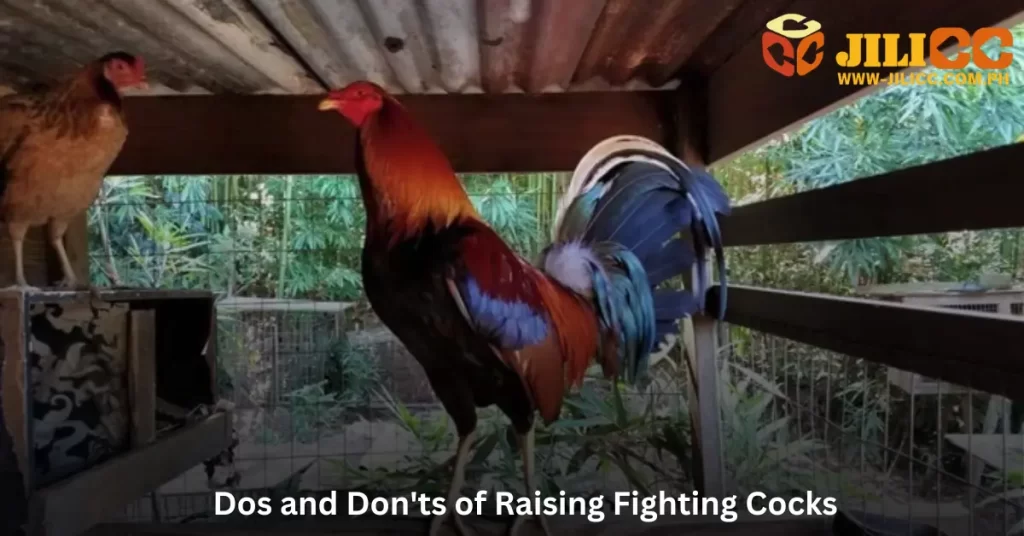Raising fighting cocks or gamefowl requires much attention to detail-from, proper nutrition and conditioning to ethics in treatment and training. The breeding and rearing of gamefowls are rampant in countries where cockfighting is a tradition, but it’s best to direct their efforts to responsible care to ensure their health and performance.
This article Jilicc will try to give an insight into the do’s and don’ts in raising fighting cocks as a means of attempting to get one through the complexities of raising fighting cocks.
Introduction About Raising Fighting Cocks
Raising fighting cocks is rather overwhelming but very rewarding work, as it calls for a proper balance between nutrition and training, ethically. While gamefowl are bred for performance, their health and welfare should always come first.

By sticking to strict do’s and don’ts, one can raise healthy and strong birds that can do well in any environment. Let’s get into the most important guidelines every gamefowl breeder should know.
Dos of Raising Fighting Cocks
1. Proper Nutrition
Of course, the most essential feature of rearing fighting cocks is proper nutrition in order to enhance their health and physical performances. Most especially, roosters need highly proteinous diets to give them strong muscles and increase their stamina.
- Feed a Balanced Diet: Fighting cocks need a combination of grains and seeds with protein-rich foods for building and developing muscles. Add to it, of course, vitamins and minerals and supplements necessary for your gamefowl.
- Increase Protein Intake: Roosters need a diet that is high in protein to maintain muscle mass and sustain energy levels during conditioning and fights . Look for feeds that contain at least 16-20% protein, and consider adding additional protein sources such as insects or meat by-products.
2. Utilize a Pre-Structured Conditioning Program
It’s training and conditioning that will give your fighting cock endurance and will enhance his fighting ability. A regular course of conditioning will make the difference in the outcome and whether your gamefowl is ready for what they must confront in the ring.
- Adopt a Conditioning Program: An exercise that is a tried and tested 21-day conditioning program that allows game fowl to progressively build endurance, agility, and strength. It is a mix of physical training, modifications of feeding, and rest periods to make their performance within the fights perfect.
- Incorporate Sparring Sessions: Light sparring helps gamefowl develop fighting techniques while getting used to the pressure of a live match. However, these sessions should be controlled in order not to result in an injury.
3. Adequate Housing and Hygiene
How your gamefowl live determines everything about their health and performance directly. Bad living conditions will affect the onset of diseases and other health problems that may hold your rooster back.
- Shelter in Spacious and Hygienic Houses: Guarantee time for exercising and freedom of movement for your fighting cock. Also, ensure cleanliness and good ventilation in their coops to avoid disease.
- Regular Health Checks: Checking health regularly among birds will, as a matter of routine, keep your birds free from parasites, respiratory infections, and a lot of other health issues. Keeping vaccinations current is very important in raising healthy gamefowl.
Don’ts in Raising Fighting Cocks

1. Don’t Overtrain
It is true that conditioning is essential to the rearing of fighting cocks. Too much overconditioning leads to fatigue, injury, and lower performance. Basically, gamefowls are athletes who need rest and recovery.
- Avoid too much sparring: Though sparring is a necessary practice, too much of it really provokes injuries or stress. Give time for your gamefowl to rest between each sparring.
- Observe for any signs of weariness: overworked gamefowl become exhausted and demonstrate various signs such as lethargy or loss of appetite. It is, therefore, very important that when such observation is made, the intensity of training should be reduced.
2. Do Not Ignore the Right Feeding Schedules
As underfeeding will result in malnourished and weak gamefowl, so overfeeding will make them obese and sluggish. The proper feeding schedule will keep your roosters lean and mean with appropriate weight and energy levels.
- Avoid Overfeeding Carbohydrates: Overfeeding with much grain or carbohydrate-laden feeds may make fighting cocks overweight and thus lose their agility. Instead, they should maintain a proper feeding schedule that could provide them with enough energy to endure the fight without growing too fat.
- Don’t Feed Inconsistently: Inconsistent feeding upsets the gamefowl and puts them off peak performance. Keep a regular feeding schedule to promote optimum digestion and nutrient absorption.
3. Don’t Ignore Ethical Concerns
Cockfighting does have its controversies, but Raising fighting cocks in an ethical and responsible way is truly important. Care in keeping the living conditions along with good treatment for your roosters contributes not just to their success but to a humane breeding attitude as well.
- Never compromise on Animal Welfare: Show respect to your gamefowl by rendering them merciful, decently housed, fed, and trained. Ethical rearing of fighting cocks means giving a healthy environment to the birds and avoiding injury to them if truly not necessary.
- Avoid cruel training: While some breeders use inhumane methods for training, it has to be reminded that humane treatment is the most vital aspect related to the wellbeing of your birds. Prioritize humane conditioning.
=> Read more: Training Gamefowl for Sabong Fights Strategy for Success.
Final thoughts about Raising fighting cocks
Raising fighting cocks requires being attentive to proper nutrition, structured training, and care from an ethical perspective. If you follow the dos and avoid the don’ts suggested within this guide, then your gamefowl will be prepared for battles, in addition to gaining health and humane treatment.
From offering high-protein diets to engagement with conditioning programs and properly housing them, it should always boil down to the birds’ welfare as your core. By focusing on ethical breeding, you will be able to raise fighting cocks that are going to be healthy, strong contenders.



Im not certain where you’re getting your info, however good topic. I must spend some time finding out more or figuring out more. Thank you for magnificent information I was in search of this info for my mission.